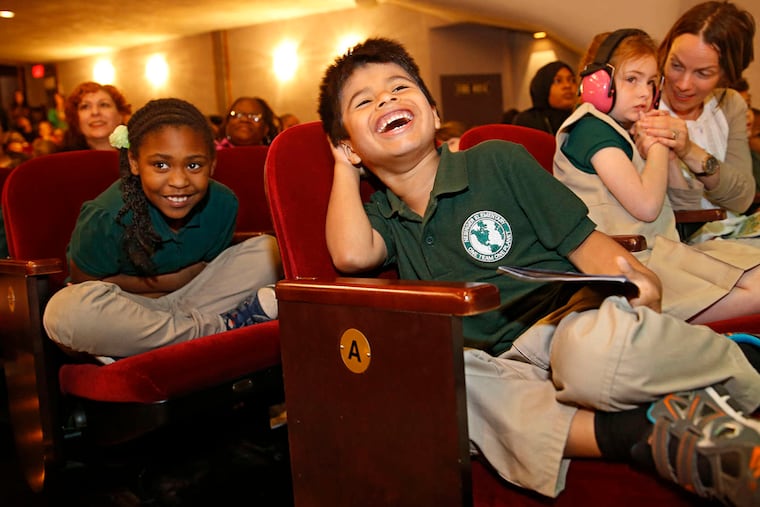Walnut Street Theatre brings 'sensory-friendly' drama to children
The Walnut Street Theatre on Wednesday was a youngster's paradise, with princess costumes and stuffed animals.

The Walnut Street Theatre on Wednesday was a youngster's paradise, with princess costumes and stuffed animals.
In a nearby quiet room, a child sat on his mother's lap, playing with a squishy ball. Above, in the mezzanine, a boy clutched his Tigger as his brother climbed over the seats.
Children squealed with glee as a tall man in a green T-shirt took the stage. "When you go to the theater, you might usually meet someone who shushes you," said Thomas P. Quinn, the Walnut's director of education. "This is a shush-free zone."
Then began the musical Miss Nelson Has a Field Day. The lights didn't dim all the way, the mics weren't quite as loud as usual, and audience members were encouraged to move around and respond vocally if they pleased.
That's because the show was modified to be "sensory-friendly" for students on the autism spectrum, many of whom had never visited a proscenium stage before.
Wednesday's performance was the first of its kind by a local theater in Philadelphia and marked the culmination of two years of collaboration between Quinn and Roger I. Ideishi, an occupational therapist and associate professor at Temple University. To create a welcoming environment for their audience, they controlled for loud noises and dramatic lighting shifts and partitioned vacancies around each group so students would not feel boxed in or claustrophobic.
Characters who would usually blow a whistle or cackle with a witchlike shriek mimed or toned down their actions. The mezzanine and orchestra levels had designated "quiet areas" with sensory manipulatives where children could go if they felt overwhelmed by the show.
To fund the initiative, Quinn applied for the Kennedy Center's Very Special Arts Program so the Walnut could provide free tickets to more than 600 people. Quinn said he received enough ticket requests to fill another performance with just his waiting list.
In the weeks before the show, the Walnut conducted workshops at George W. Nebinger Elementary School and Chester A. Arthur School, where students watched a video explaining what they might encounter at a theater and participated in acting demos to understand what performers do. Other schools received copies of the video and the recommended exercises to prepare for their experience on Wednesday.
Randee Kazatsky, an autistic-support teacher at Warwick Elementary School and a subscriber at the Walnut for 12 years, had her 11- and 12-year-old students watch the video more than once. They also read books in the Miss Nelson series, engaging with the narratives by writing alternative endings or responding to plot-specific questions.
"I am all about social skills," Kazatsky said, "and that is an area of need for all of my students. Going to the theater and being with other people, and knowing, learning, experiencing how to act in a large group is something I just can't teach in the classroom."
Anna Perng, mother of two children with autism, said she hoped they would be inspired to participate in pretend-play, which helps children on the spectrum learn how to empathize with others. Her 31/2-year-old son, who struggles with highly stimulating spaces, made it through 45 minutes of the show, and she said both children were riveted once the house lights dimmed.
"For us, it's been a very different parenting journey than our friends who have children without disabilities," she said. "And, so, to have Walnut Street Theatre really open up its doors and make these accommodations - it really opened up a whole new world of the arts for us."
Sarah Biddle, who played Miss Nelson, said, "I just signed autographs for all the kids and I got many hugs. . . . And it brought tears to my eyes, because it's so amazing that we were able to bring families together today."
Nicholas, 10, from Chester A. Arthur School, seemed to enjoy himself a lot. He sang along and cheered for the scripted football shouts, was excited about riding in a bus to and from the theater, and liked Miss Nelson because "she's strict with the kids." He also said he'd return to the theater " 'cause it's fun."
"I'll come back here with my mom some day," he said with unshakable certainty. Then Jurä Davis, the actor who played Coach Armstrong, came over to say hello, and Nicholas was much too captivated for any more interviews.
avillarreal@philly.com
@allyevillarreal